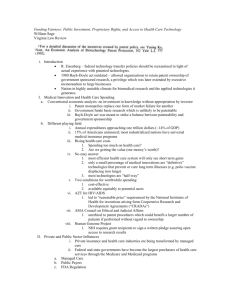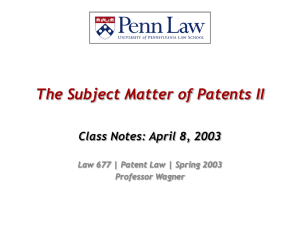Prometheus - Tech Transfer Central
advertisement
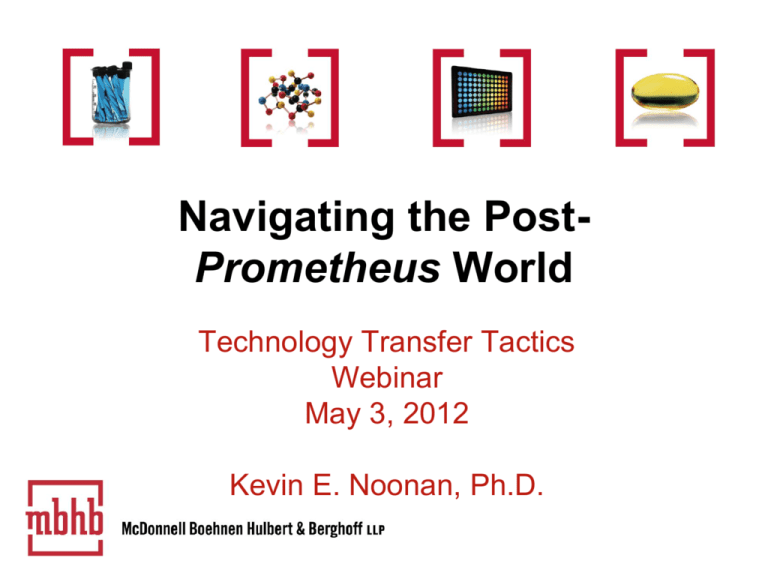
Navigating the PostPrometheus World Technology Transfer Tactics Webinar May 3, 2012 Kevin E. Noonan, Ph.D. Whoever invents or discovers any new and useful process, machine, manufacture, or composition of matter, or any new and useful improvement thereof, may obtain a patent therefor, subject to the conditions and requirements of this title. 35 U.S.C. 101. But there is an implicit exception: “laws of nature, natural phenomenon, and abstract ideas are not patentable subject matter.” How do you know if your invention is in the exception? A BRIEF HISTORY OF PATENTABLE SUBJECT MATTER Earlier cases typically overbroad • O’Reilly v. Morse: specific claims upheld, broad claim to any system for transmitting information using electricity barred • Funk Bros. Seed Co. v. Kalo Inoculants: claims not patenteligible because encompassed any combination of noninhibiting bacteria • Gottschaulk v. Benson: general method for converting binary-coded decimal (BCD) numerals into pure binary numerals on a general purpose digital computer • Parker v. Flook: method applying an algorithm to calculate alarm limits • Bilski v. Kappos: general method for hedging risk, applied to commodities trading Patent-eligible cases more specific • Diamond v. Chakrabarty: specific geneticaly engineered bacteria for breaking down oil • Diamond v. Diehr: specific application of Arrhenius equation to cure rubber • State Street Bank& Trust Co. v. Signature Financial Group (Fed Cir): “concrete, tangible and useful result • J.E.M. AG Supply, Inc. v. Pioneer Hi-Bred, Inc : broad interpretation of Section 101 • Particular issue involve algorithms and mathematical formulae Prometheus below • Claims a method for optimizing treatment of an immunemediated gastrointestinal disorder with 6-thioguanine • Recited steps of administering the drug to a patient and detecting 6-thioguanine or 6-methyl-mercaptopurine (metabolite) in blood • Recites inferring step of therapeutic efficacy when 6thioguanine levels in red blood cells are between 230 pmol-400 pmol per 8 x 108 red blood cells • Levels outside these ranges “indicates a need” to adjust administration amounts accordingly – but does not recite affirmative steps of adjusting Prometheus below • Steps for administering a drug and determining metabolites can be transformative and satisfy Bilski • Such steps can be “method of treatment” steps that are “always transformative” • Involving “natural processes” not determinative, since “every transformation of physical matter . . . occurs as the result of natural processes” • A process for chemical or physical transformation of a physical object or substance are “virtually self-evidently” patent-eligible subject matter • Inclusion of a mental step does not negate patenteligibility Question to the U.S. Supreme Court “This case concerns whether a patentee can monopolize basic, natural biological relationships. … The question presented is: Whether 35 U.S.C. § 101 is satisfied by a patent claim that covers observed correlations between blood test results and patient health, so that the claim effectively preempts all uses of the naturally occurring correlations, simply because well-known methods used to administer prescription drugs and test blood may involve ‘transformations’ of body chemistry.” The Opinion: What is claimed “The case . . . concerns patent claims covering processes that help doctors who use thiopurine drugs to treat patients with autoimmune diseases determine whether a given dosage level is too low or too high. The claims purport to apply natural laws describing the relationships between the concentration in the blood of certain thiopurine metabolites and the likelihood that the drug dosage will be ineffective or induce harmful side-effects. We must determine whether the claimed processes have transformed these unpatentable natural laws into patent eligible applications of those laws. We conclude that they have not done so and that therefore the processes are not patentable.” Patentable? No “The question before us is whether the claims do significantly more than simply describe these natural relations. To put the matter more precisely, do the patent claims add enough to their statements of the correlations to allow the processes they describe to qualify as patent-eligible processes that apply natural laws? We believe that the answer to this question is no.” Claim “Analysis” A method of optimizing therapeutic efficacy for treatment of [a disease], comprising: (a) administering a drug . . .; and (b) determining the level of [the drug], wherein the level of [the drug being] less than [a lower amount] indicates a need to increase the amount of said drug . . . and wherein the level of [the drug being] greater than [a higher amount] indicates a need to decrease the amount of said drug . . . “administering” step "simply refer[] to the relevant audience, namely doctors who treat patients" with thiopurine drugs This audience “preexisting” Claim “Analysis” A method of optimizing therapeutic efficacy for treatment of [a disease], comprising: (a) administering a drug . . .; and (b) determining the level of [the drug], wherein the level of [the drug being] less than [a lower amount] indicates a need to increase the amount of said drug . . . and wherein the level of [the drug being] greater than [a higher amount] indicates a need to decrease the amount of said drug . . . no particular method for making the determination is specified, and thus the entirety of prior art methods for making the determination is encompassed by the claim Claim “Analysis” A method of optimizing therapeutic efficacy for treatment of [a disease], comprising: (a) administering a drug . . .; and (b) determining the level of [the drug], wherein the level of [the drug being] less than [a lower amount] indicates a need to increase the amount of said drug . . . and wherein the level of [the drug being] greater than [a higher amount] indicates a need to decrease the amount of said drug . . . the “wherein” clauses simply tell a doctor about the relevant natural laws, at most adding a suggestion that he should take those laws into account when treating his patient . . . these clauses tell the relevant audience about the laws while trusting them to use those laws appropriately where they are relevant to their decisionmaking “Routine, Conventional” “[T]he steps in the claimed processes (apart from the natural laws themselves) involve wellunderstood, routine, conventional activity previously engaged in by researchers in the field” ”[A]t the same time, upholding the patents would risk disproportionately tying up the use of the underlying natural laws, inhibiting their use in the making of further discoveries" “Routine, Conventional” “These instructions add nothing specific to the laws of nature other than what is well-understood, routine, conventional activity, previously engaged in by those in the field. And since they are steps that must be taken in order to apply the laws in question, the effect is simply to tell doctors to apply the law somehow when treating their patients. The process in Diehr was not so characterized; that in Flook was characterized in roughly this way.” “Routine, Conventional” “They tell a treating doctor to measure metabolite levels and to consider the resulting measurements in light of the statistical relationships they describe. In doing so, they tie up the doctor’s subsequent treatment decision whether that treatment does, or does not, change in light of the inference he has drawn using the correlations. And they threaten to inhibit the development of more refined treatment recommendations (like that embodied in Mayo’s test), that combine Prometheus’ correlations with later discovered features of metabolites, human physiology or individual patient characteristics.” “Not Enough” Added ”The upshot is that the three steps simply tell doctors to gather data from which they may draw an inference in light of the correlations," merely "inform[ing] a relevent audience of certain laws of nature.” “To put the matter more succinctly, the claims inform a relevant audience about certain laws of nature; any additional steps consist of well understood, routine, conventional activity already engaged in by the scientific community; and those steps, when viewed as a whole, add nothing significant beyond the sum of their parts taken separately.” Natural Law “Prometheus’ patents set forth laws of nature—namely, relationships between concentrations of certain metabolites in the blood and the likelihood that a dosage of a thiopurine drug will prove ineffective or cause harm. While it takes a human action (the administration of a thiopurine drug) to trigger a manifestation of this relation in a particular person, the relation itself exists in principle apart from any human action. The relation is a consequence of the ways in which thiopurine compounds are metabolized by the body—entirely natural processes. And so a patent that simply describes that relation sets forth a natural law.” Law of Nature “If a law of nature is not patentable, then neither is a process reciting a law of nature, unless that process has additional features that provide practical assurance that the process is more than a drafting effort designed to monopolize the law of nature itself.” Flook and Diehr “The claim before us presents a case for patentability that is weaker than the (patent-eligible) claim in Diehr and no stronger than the (unpatentable) claim in Flook. Beyond picking out the relevant audience, namely those who administer doses of thiopurine drugs, the claim simply tells doctors to: (1) measure (somehow) the current level of the relevant metabolite, (2) use particular (unpatentable) laws of nature (which the claim sets forth) to calculate the current toxicity/inefficacy limits, and (3) reconsider the drug dosage in light of the law. “ Example “Einstein, we assume, could not have patented his famous law by claiming a process consisting of simply telling linear accelerator operators to refer to the law to determine how much energy an amount of mass has produced (or vice versa). Nor could Archimedes have secured a patent for his famous principle of flotation by claiming a process consisting of simply telling boat builders to refer to that principle in order to determine whether an object will float.” Keep in Mind: Policy Considerations “And so there is a danger that the grant of patents that tie up their use will inhibit future innovation premised upon them, a danger that becomes acute when a patented process amounts to no more than an instruction to “apply the natural law,” or otherwise forecloses more future invention than the underlying discovery could reasonably justify.” The Patent Goldilocks “Patent protection is, after all, a two-edged sword. On the one hand, the promise of exclusive rights provides monetary incentives that lead to creation, invention, and discovery. On the other hand, that very exclusivity can impede the flow of information that might permit, indeed spur, invention, by, for example, raising the price of using the patented ideas once created, requiring potential users to conduct costly and timeconsuming searches of existing patents and pending patent applications, and requiring the negotiation of complex licensing arrangements.” Diagnostic method claim structure General problem of “determine and infer” claims (Prof. Kevin Collins, Washington U): Characterized by one or more “determining” steps that involve assays, etc. Include “mental step” of reaching a conclusion or arriving at an inference based on outcome of determining steps Claim preamble directs method to activity (e.g., diagnosing) based on inference DMC produce information Information per se not patent-eligible Not one of the categories set forth in Section 101 Methods for manipulating data (software) subject to variable Supreme Court precedent (Benson, Flook, Diehr, Bilski) Information (data) not a “manufacture” for purposes of Section 271(g) – Bayer AG v. Housey Pharm, Inc. Are medical DMC’s different? • Hypothetical claim #1: A method for predicting a nuclear power plant reactor failure, comprising the steps of assaying pressure in a reactor coolant tank and correlating pressure fluctuations with the likelihood of failure, wherein a pressure fluctuation of +/- 7% indicates a greater than 90% likelihood that the reactor will fail. Are medical DMC’s different? • Hypothetical claim #2: A method for predicting escalation of a hurricane to Category 5 status, comprising the steps of assaying ocean temperature along a predicted storm track, wherein the hurricane is predicted to achieve Category 5 status if the ocean temperature changes by more than 5 degrees Celsius over less than 100 miles of the storm track. Are medical DMC special? • Differences in structure or differences in application? • Subject matter differences – medical DMCs relate to human body • Implicates doctor/patient relationship: • “As construed by the Federal Circuit, claim 13 provides those researchers with control over doctors' efforts to use that correlation to diagnose vitamin deficiencies in a patient.” Labcorp v. Metabolite • Precedent for treating medical methods differently – 35 U.S.C. §287(c) Additional considerations • Potential for a patent “thicket” • Involves reagents for performing the assays – need to license dozens/thousands of genes correlated with disease • Some efforts around this (patent pooling, standard setting SNP consortium, Navigenics “ASCAP” solution) • Will get worse before it gets better, particularly regarding personalized medicine 29 What do we do now? First, don’t panic! Prometheus decision not as sweeping as it first looks Analytically flawed based on conflating 101 with rest of patent statute Like many Supreme Court patent cases, cabined to some extent by its facts (claims overbroad and encompassed prior art) However, some discomfort in the short term The culprits: patent attorneys Prior precedent "warn us against interpreting patent statutes in ways that make patent eligibility depend simply on the draftsman's art without reference to the principles underlying the prohibition against patents for [natural laws]. They warn us against upholding patents that claim processes that too broadly preempt the use of a natural law.” Challenges are opportunities • “The name of the game is the claim.” Rich, J. • Whether there is “enough” more to be more than “stating a natural law and then the words ‘apply it’” will depend on how the invention is claimed • But this means we need to assess how claims will be evaluated In assessing patent eligibility, will the claims be considered as a whole? Conflict in Supreme Court precedent In Diamond v. Diehr, the Court instructed: “It is inappropriate to dissect the claims into old and new elements and then to ignore the presence of the old elements in the analysis.” In Prometheus, the Court pays lip service to Diehr (“[A] new combination of steps may be patentable . . .”), but still focuses on whether specific claim steps are “conventional or obvious” Consequence: the more conventional the method steps the easier to dissect them Distinctions between §§101, 102 and 103 • Less significant than they were before Prometheus • Consistent with Supreme Court’s aversion to substantive patent law • According to the court, the analysis can “overlap” • Once the “natural law” is discerned, assessment of whether the method recites “well-understood, routine, conventional” steps controlling Claim-drafting Strategies • Good news: the Court did not adopt the “pretend the invention is in the prior art” method • Avoid claims that only produce information • Include active steps directing more than mental activity • Make sure the “law of nature” does not constitute the only novel feature of the claim • Remember joint infringer problem Claim-drafting Strategies: Biomarkers • “Novelty” associated with new biomarker or (perhaps) new association of known biomarker for new disease • Not enough to recite detection of known biomarker known to be associated with known disease without more • Limited to method claims Claim-drafting Strategies: Prometheus A method of administering 6-thiopurine to a patient in need thereof for treating an immunemediated gastrointestinal disorder, comprising the step of administering a therapeutically effective amount of the drug that produces no less than 230 pmol and no more than 400 pmol per 8x108 red blood cells in blood from the patient. Claim-drafting Strategies: Classen A method of immunizing a mammalian subject comprising the step of administering to a patient an immunogen that is immunologically specific for an infectious disease-causing organism according to an immunization schedule that has a reduced risk for developing a chronic immunemediated disorder(s). Claim-drafting Strategies: Myriad A method for diagnosing a predisposition for breast cancer in a human subject comprising the steps of: a) obtaining a biological sample from the subject; b) determining a sequence for BRCA1 or BRCA2 from the sample; and c) detecting a breast cancer-related mutation in either BRCA1 or BRCA2 from the subject sample. Consequences for Universities Alternatives to patenting (trade secret, etc.) not viable Some proprietary positions (what doesn’t work) but not as valuable Prometheus v. Bayh-Dole compliance dilemma Requires legislative fix – political solution “[W]e must recognize the role of Congress in crafting more finely tailored rules where necessary. Cf. 35 U.S.C. §§161–164 (special rules for plant patents). We need not determine here whether, from a policy perspective, increased protection for discoveries of diagnostic laws of nature is desirable.” Our task, rather, is the narrow one of determining what Congress meant by the words it used in the statute; once that is done our powers are exhausted. Congress is free to amend §101 so as to exclude from patent protection organisms produced by genetic engineering. Compare 42 U.S.C. §2181, exempting from patent protection inventions “useful solely in the utilization of special nuclear material or atomic energy in an atomic weapon.” Or it may choose to craft a statute specifically designed for such living things. But, until Congress takes such action, this Court must construe the language of §101 as it is. Diamond v. Chakrabarty Thank you! Kevin E. Noonan, Ph.D. noonan@mbhb.com www.patentdocs.org MBHB 300 South Wacker Drive Chicago, Illinois 60606-6709 312 913 0001 phone 312 913 0002 fax www.mbhb.com
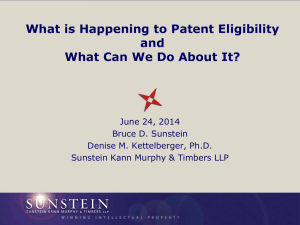
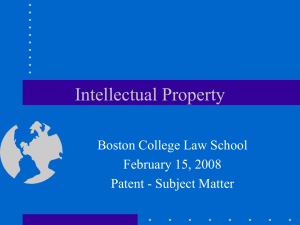
![Introduction [max 1 pg]](http://s3.studylib.net/store/data/007168054_1-d63441680c3a2b0b41ae7f89ed2aefb8-300x300.png)
